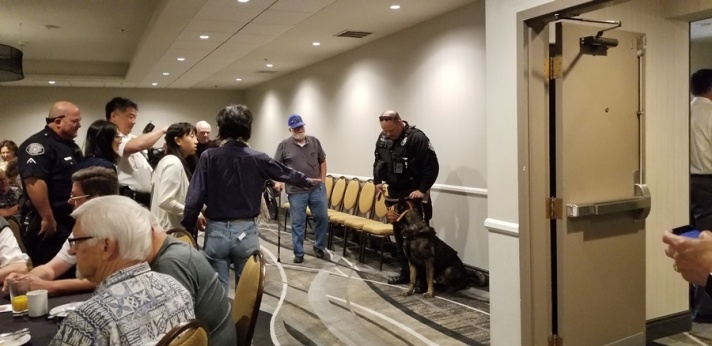More than 20 Cambridge police officers and firefighters from both city and university departments gathered in East Cambridge this month for the last week in a series of active shooter trainings.
The trainings started in January and are part of a newly implemented protocol developed to get paramedics to a scene quicker to prevent a victim from bleeding out. Under the new protocol, first responders will put themselves at risk of imminent danger by entering a scene that may still be unsafe, rather than wait for officers to deem the area completely clear.
The Police and Fire departments have been teaming up at the trainings in scenarios where they have to get victims out of a situation faster than they would have in the past, according to Fire Capt. Jeremy Walsh, who developed the new procedure. All trainings took place in the Foundry Building, a four-story open floor plan building that the Fire and Police departments have been using for training purposes.
One scenario involved the first responders entering a well-lit, open-plan “warm zone,” which means that the active shooter situation is over, but there still may be inherent danger. Paramedics entered the scene with a team of police officers surrounding them with guns pointing in different directions to keep them safe. The medics then treated victim role players and removed the victims based on who was most critical. In a real event, the victims would then be transported to the hospital as quickly as possible.
In the second scenario, police officers encountered an active shooter in a dark area with makeshift rooms. Once the officers subdued the shooter and deemed the area safe enough, the fire department was able to go in with police protection and look for victims.
‘We will be prepared’
Walsh said he wrote the new, Cambridge-specific protocol this past fall. The new guidelines are closely modeled after the Hartford Consensus, a set of expert recommendations developed to enhance survival in active shooter situations. He said the trainings have been well-received by the first responders and the departments will probably continue to do these trainings on an annual basis.
“They realize that it’s important and are happy to do it,” he said as he waited for the training to start on April 12. “If something does happen in the future, we will be prepared for it.”
Though the city’s police and fire departments do not work together on a regular basis, the relationships they have established from working together in the past makes it easier to do so, according to Walsh.
As the first responders were being debriefed after the training, police Lt. George Sabbey said the familiarity officers gain from the collaboration will prove beneficial when they are actually in dangerous conditions.
“When you recognize someone in a stressful situation you feel more comfortable, so it’s that collaboration now that will pay dividends when something happens down the road,” he said.
Working with universities
This familiarity also translates to the MIT and Harvard police departments, which were also included. Sabbey said that CPD and the university departments use the same tactics and language and have been working together for many years.
“When we get together and respond to a call, we all kind of know each other and we can all work together,” he said.
Chief John DiFava of the MIT Police Department agreed. DiFava believes the trainings were designed to increase the effectiveness, coordination, and resource integration of the responding departments.
“The MIT Police have great respect for their first responder colleagues across Cambridge and appreciate the opportunity to conduct these proactive trainings sessions in an effort to ensure that all entities are as prepared as possible in the event of a tragedy,” he said in a comment provided by MIT’s director of media relations.
There have not been any active shooter situations in Cambridge, according to Walsh and Sabbey, but both the fire and police departments have dealt with shootings before.
Posted April 24, 2018
